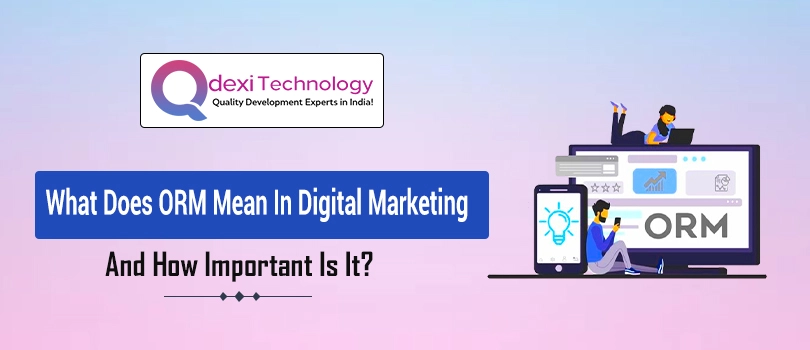In the ever-evolving landscape of digital marketing, staying ahead of the curve is paramount for businesses looking to thrive in the online realm. One term that has gained significant traction in recent years is ORM, an acronym that holds the key to managing a brand's online reputation effectively. In this blog post, we'll explore what ORM means in digital marketing, unveil its full form, and delve into why it is crucial for businesses navigating the vast and dynamic online space.
Understanding ORM in Digital Marketing
ORM in digital marketing, is a multifaceted approach to cultivating, monitoring, and influencing an entity's online presence. This encompasses everything from managing customer reviews and social media mentions to addressing negative feedback and proactively shaping the narrative surrounding a brand.
The Full Form of ORM in Digital Marketing
The full form of ORM in the context of digital marketing is "Online Reputation Management." This comprehensive strategy revolves around building, maintaining, and improving a brand's reputation across various digital platforms.
The Importance of ORM in Digital Marketing
- Building Trust and Credibility: In the digital age, consumers heavily rely on online information to make purchasing decisions. A positive online reputation instills trust and credibility in potential customers. ORM digital marketing ensures that when users search for a brand, they find positive and trustworthy content, thereby influencing their perception.
- Managing Customer Reviews: Customer reviews wield immense power in shaping public opinion. ORM involves actively monitoring and responding to reviews on platforms like Google, Yelp, and social media. Acknowledging positive reviews and addressing negative ones demonstrates a commitment to customer satisfaction, fostering a positive online reputation.
- Mitigating Negative Publicity: Negative publicity can spread like wildfire in the digital realm. ORM equips businesses with the tools to address and mitigate negative comments, reviews, or press. Swift and thoughtful responses can turn a potentially damaging situation into an opportunity to showcase transparency and a commitment to improvement.
- Enhancing Search Engine Visibility: Search engines consider the online reputation of a brand when determining search rankings. A positive online reputation can contribute to higher search engine visibility, making it easier for potential customers to find and choose a particular brand over competitors.
- Social Media Presence: Social media platforms are powerful channels for communication, and ORM ensures that a brand's presence on these platforms is positive and engaging. Regularly monitoring social media mentions and actively participating in relevant conversations can strengthen a brand's connection with its audience.
- Brand Image Control: ORM empowers businesses to take control of their brand image. Through strategic content creation, engagement with the audience, and crisis management, brands can shape a positive narrative that aligns with their values and goals.
Conclusion
In the dynamic landscape of digital marketing, managing an online reputation is not just a luxury but a necessity. ORM goes beyond crisis management; it is a proactive strategy that helps businesses build trust, manage customer perception, and stay resilient in the face of challenges. As businesses continue to invest in their online presence, embracing the power of ORM is a crucial step toward sustained success in the digital realm.






